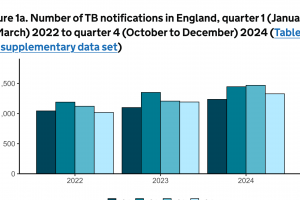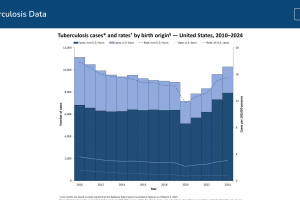Tuberculosis Vaccines
Tuberculosis Vaccines 2025
According to the World Health Organization (WHO) Global Tuberculosis Report 2024, tuberculosis (TB) is a vaccine-preventable disease. As of March 23, 2025, the WHO says increasing access to TB vaccines could save up to 1.9 billion antibiotic doses annually, helping reduce antimicrobial resistance. Versions of the Bacille Calmette-Guérin (BCG) vaccine have been used for about 100 years. Since 1921, over 4 billion BCG vaccinations have been completed worldwide. While BCG has demonstrated significant effectiveness (50%), protection against all TB forms in all age groups has not been consistent. As of 2025, no universal BCG vaccination policy exists, however, clinical trials are accepting new participants.
WHO's Product Development for Vaccines Advisory Committee (PDVAC) has called for the development of a WHO-preferred product characteristic (PPC) for new TB vaccines. Several BCG vaccines based on 14 different bacteria strains are available worldwide. The WHO's End TB Strategy outlines the Sustainable Development Goals to End TB by 2030. As of March 14, 2025, the WHO's TB Research Tracker listed vaccine candidates in clinical development, with four in Phase III scheduled to end in 2025.
As of 2024, the Bill and Melinda Gates Foundation and Wellcome pledged $550 million (Gates Medical Research Institute) to support late-stage clinical trials for a new tuberculosis vaccine.
Tuberculosis Vaccine United States
Merck's TICE® BCG vaccine is approved by the U.S. Food and Drug Administration (FDA) (STN: 103050) and produced by Organon Teknika Corp., LLC for use in the USA. BCG vaccination is considered for people who meet specific criteria, such as children with a negative TB who are continually exposed and cannot be separated from adults who are untreated or ineffectively treated for TB, according to the U.S. Centers for Disease Control and Prevention (CDC).
As of March 13, 2025, the Serum Institute of India and ImmunityBio’s recombinant Bacillus Calmette-Guérin (rBCG) became available in the U.S. for bladder cancer therapies. Anova Enterprises, Inc. is helping ImmunityBio manage the rBCG Expanded Access Program. The rBCG vaccine has two gene modifications to improve its immunogenicity and safety. It has demonstrated potent immunogenicity with CD8+ and CD4+ T-cell stimulation and improved safety compared to earlier BCG strains and formulations.
Tuberculosis Vaccines Global
Blessina Kumar, a member of WHO's Civil Society Taskforce on TB, confirmed 16 TB vaccines were available in countries such as the U.S., Canada, China, Cuba, Ethiopia, Jamacia, Japan, Germany, UK, Mexico, Europe, Brazil, Korea, Russia, Spain, South Africa, Quebec, India (1948), New Zealand, Australia, Venezuela, and Nigeria. The BCG Atlas is an open-source database of global BCG vaccination policies and practices. In 2002, Neonatal BCG vaccination was practiced in 157 countries and territories.
The Serum Institute of India (SII) rBCG vaccine TUBERVAC-rBCG was approved in 2023 as a single-dose vaccine for the prevention of TB. In July 2023, the Indian government approved exporting the rBCG vaccine to Canada for immunotherapy to treat bladder cancer. On February 19, 2025, the U.S. Food and Drug Administration (FDA) authorized an expanded access program to bring the rBCG to patients in the U.S. As of March 2025, SII is the world's largest manufacturer of BCG vaccines.
BCG vaccine AJV (A.J. Vaccines) is the only licensed BCG vaccine in the UK in 2023. Beginning in September 2021, eligible babies born in the UK were offered the BCG vaccine at 28 days or soon after. This PGD is for the administration of BCG Vaccine AJV to individuals up to 16 years of age who are at increased risk of TB.
Verity Pharmaceuticals Inc. VERITY-BCG™ Strain Russian BCG-I) in Canada. VERITY-BCG™ is an adjuvant therapy and is only recommended for stage Ta grade 1 papillary tumors when there is judged to be a high risk (>50%) of tumor recurrence.
France BCG vaccine program (Pasteur 1173P2).
Brazil strain (BCG oral Mearou RJ)
Bulgarian substrain (Sofia SL222)
Japan 172 strain (Tokyo 172-1)
BCG-Denmark 1331 - Statens Serum Institute BCG-Denmark vaccination had a beneficial effect on herpes. However, another study concluded that it did not reduce initial QFT Plus conversion risk in healthcare workers.
Tuberculosis Vaccine Candidates
Sponsored by the International AIDS Vaccine Initiative, the H56:IC31 TB vaccine candidate contains the fusion proteins Ag85B, ESAT-6, and Rv2660c, along with the IC31 adjuvant. It has been highly anticipated due to its potential to decrease tuberculosis recurrence rates. In clinical trials, H56:IC31 has been found safe and capable of eliciting strong T-cell responses and specific IgG antibodies in adults undergoing treatment for drug-sensitive tuberculosis and in HIV-negative healthy adolescents.
MTBVAC is the first live attenuated BCG vaccine of Mycobacterium tuberculosis isolated from a human. In 2024, Bharat Biotech International Limited started a series of clinical trials in collaboration with IAVI and Biofabri. If MTBVAC is shown to be efficacious, Biofabri, IAVI, and other partners will work together to ensure a sufficient, affordable supply is available for low—and middle-income countries.
The M72/AS01E (M72) subunit protein vaccine candidate combined with GSK's Adjuvant System AS01 is conducting phase 3 clinical research. As of March 2025, a Phase 3 trial is ahead of schedule and has already recruited 90% of the 20,000 people it needs.
The University of Oxford conducted a phase 1 clinical trial for an aerosol-inhaled live-attenuated Mycobacterium bovis BCG. On April 12, 2024, this first-in-human aerosol BCG-controlled human infection model was reported to be sufficiently well tolerated. Further work will evaluate the utility of this model in assessing vaccine efficacy and identifying potential correlates of protection.
Access to Advanced Health Institute published the results of a Phase 1 clinical trial (June 2023) in collaboration with the U.S. NIH. The trial demonstrated the safety and immune responses of a novel vaccine against TB that combines several proteins from Mtb into a fusion protein (ID93) and a proprietary immune-stimulating adjuvant (GLA-SE) in a freeze-dried formulation.
BioNTech SE announced clinical trial plans for its mRNA vaccine candidate for TB on July 26, 2021. In April 2023, BioNTech initiated a Phase 1 clinical trial of BNT164, an mRNA vaccine candidate against TB, in partnership with the Bill and Melinda Gates Foundation. A Phase Ib trial (NCT05547464) conducted in Africa evaluates three dose levels of the BNT164 investigational vaccines (BNT164a1 and BNT164b1) to select a safe and tolerable dose in a three-dose schedule. A Phase Ia trial (NCT05537038) will evaluate four dose levels of the BNT164 investigational vaccines (BNT164a1 and BNT164b1) in a three-dose schedule.
SII VPM1002 is a recombinant BCG vaccine derived from the Danish subtype Prague. It expresses listeriolysin, which enables the bacilli to access the host cell cytoplasm and, thus, potentially enhance CD8+ T-cell activation. It also induces inflammasome activation.
IDRI's ID93 + GLA-SE TB vaccine candidate was found safe and immunogenic in healthy adults on March 6, 2023. A US NIH-funded randomized clinical trial of single-vial lyophilized ID93 + GLA-SE is ongoing. ID93+GLA-SE was developed by Christopher B. Fox, Ph.D., and scientists at the Access to Advanced Health Institute and is a recombinant subunit vaccine made from four proteins of Mycobacterium tuberculosis bacteria combined with GLA-SE, an immune-stimulating adjuvant.
BIOFABRI MTBVAC is a live attenuated vaccine against TB conducting phase 3 clinical research.
The Gamaleya Federal Research Center of Epidemiology and Microbiology's GamTBvac is in Phase 3 development.
Longhorn Vaccines and Diagnostics LLC LHNVD-301 is an unconjugated, peptide-based vaccine that combines an MTB heat shock protein epitope and a peptidoglycan (PGN) epitope. PGN is a cell wall component of bacteria that plays an essential role in infections. The combination of heat shock protein and PGN generates broad reactive antibodies. It represents a novel approach that combats AMR while targeting tuberculosis by combining multiple epitopes specific to MTB and common to gram-positive bacteria into a peptide vaccine.
The National Institutes of Health recently awarded the University of Montana a $12.3 million contract to develop a novel adjuvant for TB vaccines. The grant to the University of Montana's Center for Translational Medicine will advance a TB vaccine candidate from pretrial to clinical trials.
CanSinoBio and Etana are conducting clinical research in Indonesia for the AdHu5Ag85A vaccine.
Research published by the University of Pittsburgh on January 10, 2025, in Nature Microbiology suggests a self-destructing vaccine administered intravenously provides additional protection against tuberculosis in macaque monkeys.
Recombinant BCG Vaccine
Recombinant BCG (rBCG) has demonstrated potent immunogenicity with CD8+ and CD4+ stimulation and improved safety compared to standard BCG in European clinical trials. rBCG strains expressing immunomodulatory factors have been investigated for 30 years to enhance immunotherapy against bladder cancer and other diseases. Serum Institute of India (SII) confirmed in May 2024 that it was manufacturing next-generation rBCG. Researchers from Brazil's Butantan Institute and collaborators stated on July 3, 2024, that they are developing an rBCG vaccine that increases the protection rate to 99% and has a more extended protection period.
Universal BCG Vaccine
World leaders have committed to licensing at least one new TB vaccine. WHO-commissioned research estimates that, over 25 years, a universal BCG vaccine that is 50% effective in preventing TB could avert up to 8.5 million deaths and reduce $6.5 billion in health costs. Harvard T.H. Chan School of Public Health researchers announced on February 17, 2023, that a recent study found that introducing an effective TB vaccine in low—and middle-income countries could lead to billions of dollars in potential health and economic benefits.
Gene-Edited BCG Vaccine Candidate
In April 2024, researchers at the University of the Witwatersrand School of Pathology published a breakthrough study in TB vaccine development. They gene-edited the BCG to make it more effective. A modified BCG with depletion of enzymes associated with peptidoglycan amidation induces enhanced protection against tuberculosis in mice. In vitro and in vivo experiments in this study demonstrate the feasibility of gene regulation platforms such as CRISPRi to alter antigen presentation in BCG in a bespoke manner that tunes immunity towards more effective protection against TB disease.
Tuberculosis Vaccine Vs. Treatment Cost
The global average cost for BCG vaccination is about $5.00. According to USAID, treating a tuberculosis case in the U.S. costs about $20,000, and a drug-resistant tuberculosis case can cost over $150,000.





